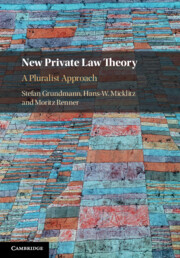Book contents
- New Private Law Theory
- New Private Law Theory
- Copyright page
- Contents
- Preface
- New Private Law Theory
- Part I Methods and Disciplines
- Part II Social Ordering, Constitutionalism and Private Law
- Part III Transactions and Risk: Private Law and the Market
- Part IV Persons and Organizations
- 18 Person, Civil Status and Private Law
- 19 Theory of the Corporation
- 20 Actors in Organizations
- 21 The Principal’s Decision
- 22 Organizations and Public Goods
- Part V Private Law (Rule-Setting) beyond the State
- Index
- References
18 - Person, Civil Status and Private Law
from Part IV - Persons and Organizations
Published online by Cambridge University Press: 09 April 2021
- New Private Law Theory
- New Private Law Theory
- Copyright page
- Contents
- Preface
- New Private Law Theory
- Part I Methods and Disciplines
- Part II Social Ordering, Constitutionalism and Private Law
- Part III Transactions and Risk: Private Law and the Market
- Part IV Persons and Organizations
- 18 Person, Civil Status and Private Law
- 19 Theory of the Corporation
- 20 Actors in Organizations
- 21 The Principal’s Decision
- 22 Organizations and Public Goods
- Part V Private Law (Rule-Setting) beyond the State
- Index
- References
Summary
This chapter addresses one of the most prominent developments in private law in the twentieth century, the introduction of status-related rights, where status is connected to a higher degree of protection in law than the ‘normal’ person receives. The European Union is playing a prominent role in this development, in the field of non-discrimination (Chapter 14), but also in the field of consumer law. The difficult question is the decision on what a consumer is and when and under what conditions they may enjoy a higher degree of protection.
- Type
- Chapter
- Information
- New Private Law TheoryA Pluralist Approach, pp. 341 - 359Publisher: Cambridge University PressPrint publication year: 2021

